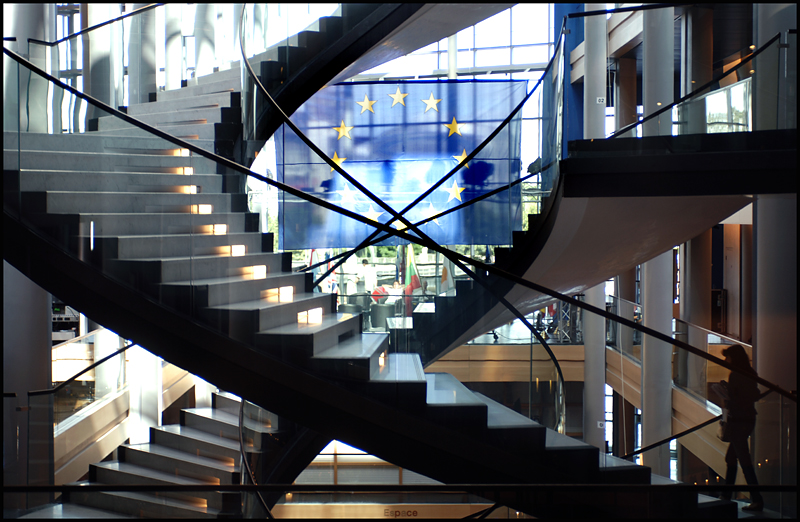This October was the 50th anniversary of the unveiling of the Werner Plan , the first attempt to create an economic and monetary union in Europe. The text, written on a typewriter, retains its topicality to this day. It points out that transnational economic integration and the flow of speculative capital are sources of instability and that Europeans should create federal structures in order to have sufficient scale and resources to offset these shocks. The parallels with the present day are obvious. The unilateralism of the US was a concern at that time too (Nixon ended dollar/gold convertibility and imposed import duties just a year later) and the established international order fell apart right in front of European eyes.
Against this backdrop the plan devised by Pierre Werner, the Prime Minister and Finance Minister of Luxembourg, argued for a monetary but also an economic union. The group of experts who designed it, made up of central bankers but also senior political figures from the treasury ministries, had agreed that establishing a single currency was absolutely necessary, but also that this required a fiscal union and greater harmonisation of economic policies (including social policies), and this naturally entailed the creation of a political union. It was thus the same debate we are having half a century later . And the most fascinating thing about the text is its statement that with the creation of a monetary union the ‘[European] Community will have to declare, vis-à-vis the rest of the world, its own objectives of international political economy’.
“For many years Europe has restricted itself to focusing on the economic dimension”.
I have been a student of international political economy for almost 20 years and, until the other day when I reread the Werner Plan, I had hardly ever (and possibly never) seen this concept in an official EU document. This is symptomatic of what has happened in Europe between the presidencies of Richard Nixon and Donald Trump. As we all know, the single currency only arrived 30 years after Werner, and fiscal union is still a work in progress . For many years Europe has restricted itself to focusing on the economic dimension. As Lorenzo Bini Smaghi once remarked, the EU has become an economic giant, but has remained a political dwarf. It has the second most important currency in the world, but punches far below its weight in the great strategic debates.
For a time, especially when the US under George W. Bush launched itself into the disaster in Iraq, the Europeans felt comfortable with this position. The US was Mars (god of war), and Europe was Venus (goddess of love, beauty and fertility). In the era of hyperglobalisation (between 1990 and 2008), the US took it upon itself to be the world’s policeman while Europe could just focus on doing business. The emerging markets, above all China, but also countries like Brazil and India, were moreover a bounteous source of cheap labour and middle classes with growing purchasing power. In Germany (which this year celebrates 30 years of reunification), as well as in Brussels, the idea had taken root that the rest of the world was going to follow the steps of Central and Eastern Europe. They would leave totalitarianism behind and embrace liberal democracy and the free market. Some at the Pentagon and the State Department were driven to despair. Time and again they asked, ‘When are you Europeans going to be start thinking beyond national economic interests and forging a strategic vision? You’re being very naïve with China. Wake up!’.
“But this obsession with greater economic and financial integration made the European elites too dogmatic when it came to driving globalisation, without realising the harmful collateral damage it was causing”.
But this naiveté had an explanation. The EU had been founded on economic integration, on breaking up national monopolies and bureaucracies and, using the ‘Monnet Method’, creating a single market, which would in turn require a transnational regulatory framework. This method had shown that integration had to be achieved by sector, at a technical level (putting politics to one side, and industrial policy in the dustbin of history) because this ultimately snowballed, or spilled-over, such that integration in one area required more integration in other areas. The method is still applicable today. Schengen means that we must integrate with each other more in the health field to be able to restore tourism within the Union. But this obsession with greater economic and financial integration made the European elites too dogmatic when it came to driving globalisation, without realising the harmful collateral damage it was causing .
Many still cling on to the Venus metaphor today. They lament the fact that the US is more protectionist, that China and India are more nationalist and that the UK has become more nativist. It is as though the collapse of the liberal world order was not the fault of the Europeans. But just as there was a Chicago school that defended laissez faire there was also a Brussels school (supported by Frankfurt) that had a blind faith in the virtues of the market. It was precisely this school that provided the ideological support to Berlin when it argued that ‘the markets’ would be responsible for disciplining the countries of the south in the financial and debt crisis that began in 2008 and did not end until 2012. Fortunately, Angela Merkel realised the mistake and accepted the creation of a banking union, and Mario Draghi restored the international political economy concept and declared that the ECB would do whatever it took to save the euro . At last, economics and politics once again converged in Europe.
For many years in the EU, and in the Union’s member states, the economic and foreign ministries and departments have worked with their backs to each other. This is a clear symptom of the lack of strategic culture. The US, with all its mistakes, enjoys greater integration in these two spheres (those who devote themselves to business and those who worry about national security). A clear example is the Committee on Foreign Investment in the US (CFIUS). This committee is part of the Treasury Department, but many other ministries (the State Department, Defence, etc) have CFIUS units and naturally there is an interministerial committee that decides if a specific foreign investment could threaten national security. In Europe there are countries such as France, and even Spain, that have similar mechanisms, but until recently the control was much more lax, and this accounts for two recent strategic mistakes.
The first took place in 2011 , during the crisis, when the Brussels obsession with privatisation allowed the Portuguese public electricity utility, EDP, to fall into the clutches of the ‘public’ Three Gorges Corporation from China. Rather ironic. And the second was when the Chinese company Midea bought the German robotics firm Kuka in 2016. This came as a shock to the German elites. From then on they started to think in a more strategic way about their relationship with China, which up to then had been based almost exclusively on business. In general, the debates in Germany have gained momentum. Merkel and a large part of the German business establishmenthave realised that China is not going to embrace liberalism in the near future and that its state capitalism, with its new strand of techno-authoritarianism , represents a real challenge to the German and European socio-economic model.
People in Germany are once again speaking of the need to restore the social market economic principles of Rhenish capitalism. There is a recognition that too much emphasis has been placed on the market (and globalisation) while the social aspect has been neglected. Thus, Germany is becoming more French. Naturally, the emergence of Alternative for Germany with 100 deputies in the Bundestag, added to the mess of Brexit , the rise of Le Pen and Salvini, and the geopolitical earthquake of Trump , have set off alarm bells. Some lay the blame at Merkel’s door. They argue she was very short-sighted in the previous crisis and imposed too much austerity on the south. It is true that Merkel clung to the German tradition of letting the markets do their work, but internal pressure did not leave her much room for manoeuvre. It is well known that Germany has always been a reluctant power, and had Merkel launched a Marshall Plan in 2010 she would not have enjoyed the support either of her party or German society.
Returning to the creation of the euro, the fear in Germany and in other northern states such as the Netherlands has always been that monetary union would become a union of transfers. This fear remains, but in the last 10 years Merkel has achieved something extraordinary. By being firm in the negotiations in the previous crisis she secured two things. She won the trust of the electorate and she has given way in Europe whenever it was necessary. The consequence was that the hawks in her party and in the conservative Germanestablishment felt increasingly marginalised, to the extent that various eurosceptic economics professors were the ones who set up Alternative for Germany. Today, however, all Merkel’s successors in her party support the EU recovery plan despite the fact that it crosses one of Germany’s traditional red lines: the issuing of joint debt (Merkel herself had said that there would be no Eurobonds in her lifetime).
But the COVID-19 pandemic has changed everything and thanks to the accumulated political capital and the insistence of the French President Emmanuel Macron, Merkel has accepted greater debt levels; not out of altruism, but out of a firm conviction that if the continent is unstable, Germany will be too. This line of reasoning has a series of implications for the Union, both internal and external. The first is that unless we achieve more convergence in our societies, both between and within the countries of the Union, we will not be strong internationally. The pandemic is only going to increase inequalities and social malaise and the European model of capitalism, based precisely on social market economies, has to be capable of rising to this challenge. Indeed, the recovery fund must help our economies to become more modern, sustainable and inclusive. For Spain and other net recipient countries it is a unique opportunity. Unless it is seized, Werner’s 50-year-old dream of creating a fiscal union will become more remote.
“Amid the increasing geopolitical rivalry between the US and China, Merkel has grasped that Europe has to take its own destiny in its hands on the basis of greater strategic autonomy and using the pillars of the European capitalist model”.
The EU is thus facing an historic moment. Incurring joint debt until 2058, sharing out €750 billion (the equivalent of 60% of Spain’s GDP), setting up the bureaucratic and democratic mechanisms to enable the money to be used in an effective way and striking an agreement on joint tax-raising in order to return it is going to be a critical test. Some call it a Hamiltonian moment, but I would call it a ‘Merkelian’ moment. Amid the increasing geopolitical rivalry between the US and China , Merkel has grasped that Europe has to take its own destiny in its hands on the basis of greater strategic autonomy and using the pillars of the European capitalist model, based on political pluralism, the rule of law, the free market and the welfare state. Europe has to pass from Venus to Janus, the god of gateways and transitions. Gateways, because in the face of the protectionist tide Europe must remain open (but not ingenuously, and being able to deny admission if necessary); and transitions in plural because Janus has two faces, one that looks to the past, the other to the future, and Europe needs to avoid the mistakes of the past in order to have a brighter future (which necessarily has to be green). It is also said that Janus looks to the West and the East, and this is what the EU has to do. Turning our back on China, as some advocate, would be a serious error. And Josep Borrell, the EU’s High Representative for Foreign Affairs, knows this well. The dynamism of the future lies in Asia. And, of course, in the south: in Africa (which brings us back to the importance of gateways).
Lastly, Janus is the god who protects the state. Here too the plural should be used. The EU is a union of states, and will remain so for a long time, and if these are weak, the Union will be too. But the EU is also taking steps –the recovery fund is proof of it– to turn itself into a proto-state. May Janus nourish and protect it. The challenges of international political economy that loom over us are enormous.



